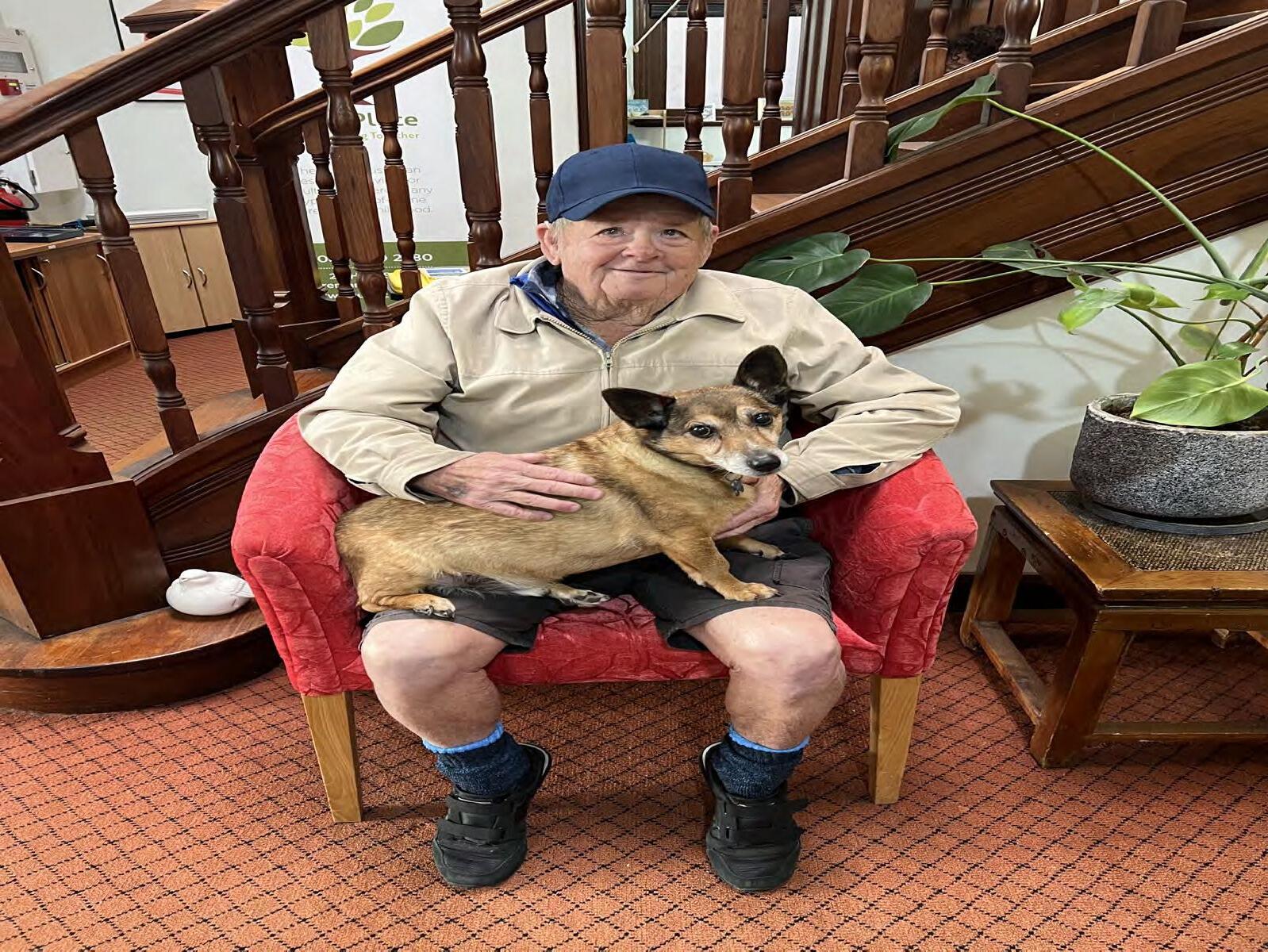

Tuart Place
Community member Neil with Tuart Place support dog Manni
Our Purpose
We walk alongside Care Leavers as they come together to connect with community, find support and lead their own journey of healing.
Our Vision
A world where every Care Leaver feels valued, connected and supported to shape their own future.
Our Values
The T-U-A-R-T values acrostic was developed by Tuart Place support group members in March 2012.
T TOGETHER, we build “It just builds confidence in you, it builds camaraderie.”
U UNDERSTANDING
A ACCEPTANCE
R
RESPECT
“Coming into Tuart Place has helped me see some light, and to be acknowledged, to be understood.”
“I’m not lonely because I know there are many, many more people like me.”
“I’ve gained a lot of strength from a lot of people that come here to Tuart Place.”
“One of the things I’ve learned since I’ve started coming to

Specialist aged care support from our onsite aged care finder
• Regular visiting services, including financial counselling, pop-up health clinics, hearing checks, podiatry, haircuts and beauty treatments.
• Computer literacy and IT assistance
• Family tracing and supported access to records
• Advocacy, liaison, and referral to other support services
• A drop in centre, social events and reunions, organised with participants
2025 Annual Report
Table of contents

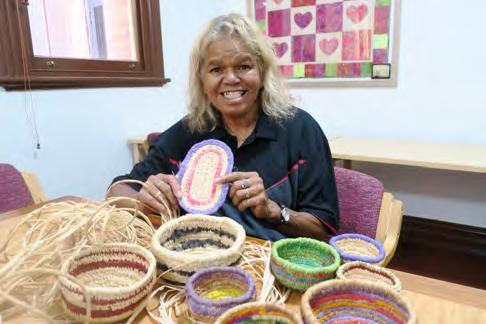
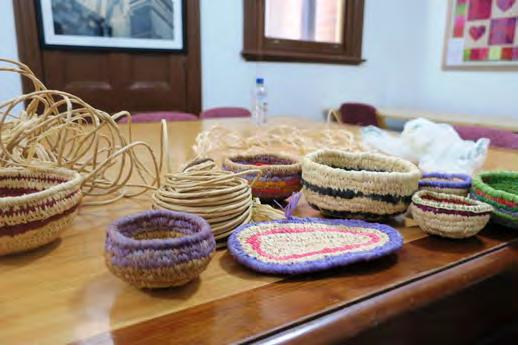

Tuart Place has been honoured to support the community from our beautiful centre in Walyalup for more than a decade.
The connections we make in this place support all of us to grow stronger together.
We pay our sincere respects to the Traditional Owners of the country on which we work and gather, the Whadjuk Noongar people, and acknowledge their continuing connection to land, waters and community.
These pictures were taken during a basket weaving workshop with Noongar artist and Tuart Place community member, Sandra Egan.

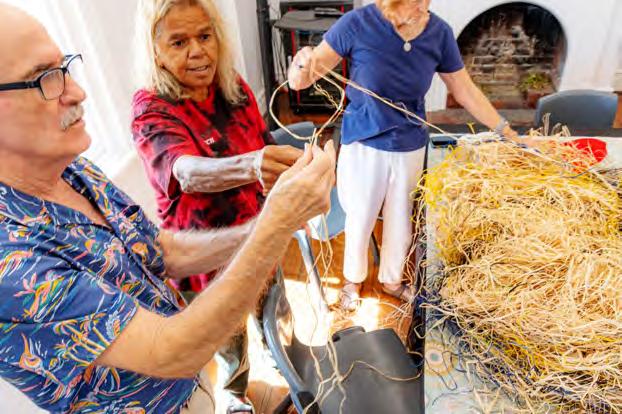

FACT Board of Governance 2024-2025

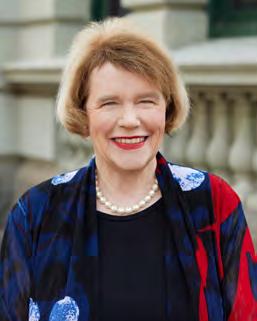
About our Board
Tuart Place is governed by the Board of Forgotten Australians Coming Together (FACT) Inc.
The Board brings together people with lived experience of out-of-home care, alongside members chosen for their skills and professional backgrounds in areas such as law, social work, accounting, service management, and research.
Each member is elected as an individual and appreciated for their unique strengths, experience, and insights. While some may be connected to other organisations, they serve the Board independently. All contribute their time generously on a voluntary basis.
Tuart Place is proud to lead the way in coproducing trauma-informed support services for Care Leavers in Australia members of the Stolen Generations, the Forgotten Australians; and former child migrants. Peer leadership is at the heart of how we govern and deliver our services.
Board member profiles and further information about FACT Inc is available on the Tuart Place website at www.tuartplace.org/about/our-board/

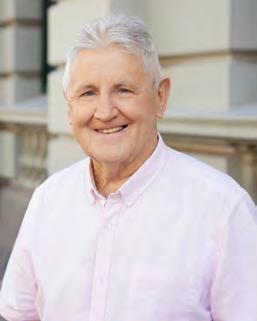
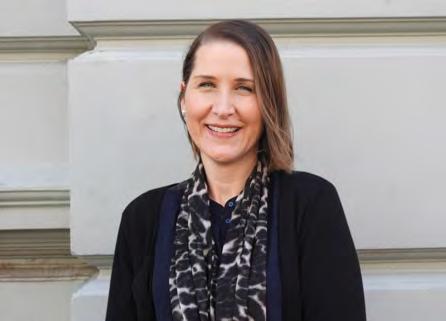
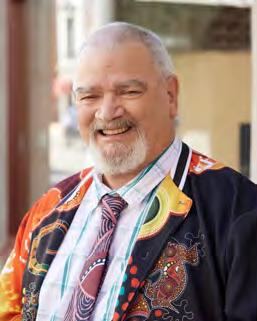


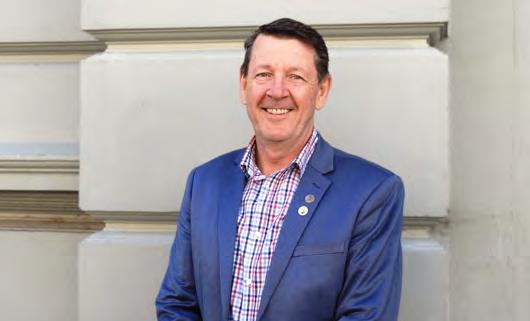

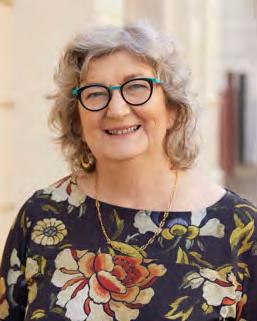
John Ryall Chairperson
Dale Lynch (Retired) Vice-Chairperson
Ross Stagno Treasurer
Lyn Sherwood Acting Vice-Chairperson
Kevin Collins
Sue Bailey
Ann McVeigh
Mia Lanigan Margo O’Byrne
Jacques Duvenhage
Mark Farmer
Tuart Place participants and clients
Demographic profile: June 2024 to July 2025
The demographic breakdown of Tuart Place participants and service users is presented in the table below, showing age group, gender, Care Leaver ‘category’, and geographic distribution.
During the 2024/2025 financial year, Tuart Place provided direct services to 922 individuals. Over this period, we completed 207 new client intakes. This represents a small overall increase on the 2023/2024 financial year, when 889 individuals accessed direct services.
Our client base continues to reflect an ageing population, with nearly 65 per cent of service users aged 50 and over. The key groups Tuart Place supports, including Forgotten Australians, former child migrants, and Stolen Generations members, tend to be older people.
Notably, there was significant growth in the 18 to 50 age group over the past year.
The number in this group rose from 220 to 295 a 34 per cent increase .
People aged 18-30 years now make up 32 per cent of our overall client population.
There was also a continued rise in First Nations representation in 2024/2025, with Aboriginal Care Leavers now accounting for 52 per cent of the total group.
This growth reflects both increased engagement with the National Redress Scheme and the continued trust in Tuart Place, evidenced by positive word-ofmouth referrals from current participants.
Since beginning to record data on homelessness in January 2024, we have identified 297 clients as either homeless or at risk of homelessness, accounting for just over 30 per cent of our client group.
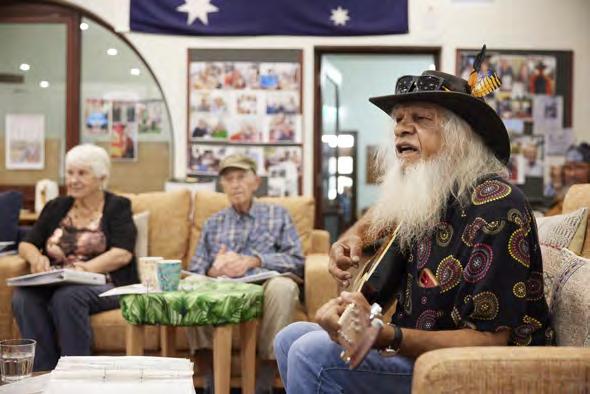
Who is eligible for Tuart Place services?
Tuart Place is a resource service for Care Leavers. Care Leavers are people who experienced out-of-home care during childhood, in settings such as orphanages, missions, foster care, and group homes. Care Leavers include Forgotten Australians, former child migrants, members of the Stolen Generations and other Aboriginal people placed in care in the last century.
Chairperson’s Report
As I write this report, I find myself reflecting on just how far we’ve come year, but over the many years Tuart Place has been part of our lives. As someone who grew up in care, I know what it means to go without support, to feel disconnected, and to carry the weight of past experiences. That’s why it means so much to be part of something like this place built by and for people like us.
This has been a big year for Tuart Place. At the top of the list is the wonderful news that we’ve secured our future at 24 High Street. After years of uncertainty, and a whole lot of stress for our community, we now have a new five-year lease, thanks to the goodwill of the new owners, Leonie and Tim Baldock. I can’t tell you what a relief this is. For many of us, this place isn’t just a service it’s a second home. It’s where we feel safe, connected, and understood. Knowing we can stay put means the world. I extend my thanks to Margo O’Byrne for her tireless work leading the Sustainable Tenancy Reference Group.

Mr John Ryall
This year also saw some exciting steps forward in digital inclusion, especially for older Care Leavers like myself. Thanks to a Building Digital Skills grant through the Be Connected initiative, we’ve been able to expand our IT and digital literacy support. Many of our participants now feel more confident using smartphones, emails, MyGov, and other essential online services. For some, it’s the first time they’ve felt truly connected in the digital world and that’s a big deal. Our team of IT volunteers has played a huge role in this space, offering patient, one-on-one support that’s made a real difference.
Of course, the real magic at Tuart Place happens quietly every time someone walks through the door and feels welcome. Every time a person finds a connection, opens up in a support group, learns a new skill, or just has a laugh over a cuppa with someone who “gets it.” This kind of connection can’t be measured, but it’s the heart of what we do.
Our dedicated staff continue to amaze me with their compassion, professionalism, and ability to walk alongside people with care and respect. Thank you for everything you do. And to our incredible team thank you for giving your time, energy, and heart to this community. You make a real difference, every
A very special thanks and heartfelt congratulations to Dr Philippa White, our Director, whose leadership continues to steer Tuart Place with both vision and heart. Philippa brings a rare combination of integrity, intelligence and deep compassion to her work and her commitment to Care Leavers never wavers. She has been instrumental in building the strong, inclusive, and responsive service we see today. On behalf of the Board and our whole community thank you, Pip. We also continue to benefit from the guidance of our three wonderful Patrons Dr Robert Isaacs OAM, Senator Dean Smith, and former Senator Rachel Siewert. Their ongoing support and advocacy mean a great deal to us, and we are incredibly grateful for the time and expertise they so generously offer.
To my fellow Board members thank you for your steady leadership and thoughtful guidance. It’s a privilege to serve alongside you.
Looking ahead, there will be challenges there always are. But I believe we’re as strong as we’ve ever been, and more united than ever. Tuart Place continues to be a community built on shared experience, mutual support, and a fierce commitment to justice. It’s a place where people can come as they are and know they’re not alone.
I’m honoured to serve as Chair, and I’m proud to be part of this ongoing journey. To all of you who are part of the Tuart Place family thank you. Let’s keep growing strong together.
John Ryall, Chairperson, FACT Inc.
Tuart Place volunteers
Thank you for all you do!
At Tuart Place, we’re lucky to have a fantastic team of volunteers who make a huge impact on the lives of the people we support.
From day one, volunteers have been at the heart of what we do, helping to create a welcoming, caring environment where everyone feels safe and supported.
Whether it’s providing a listening ear, leading programs, or lending a hand with daily tasks, our volunteers give their time and energy in so many ways. Here is just a taste of what volunteers have contributed to Tuart Place this year:
• Our famous Craft Ladies have once again made and donated raffle prizes and Christmas gifts
• Our participant volunteers help with many different tasks at the center - a special thanks to Maria, Dave, Mary, Fran, Ingrid, James and Ted
• Our IT expert volunteers - Victor, Isis, Jessie, Phil and Angela - help people with their phones and digital skills
• Jill, Cecilia, Jessie, Charlotte, Marshella, Mary and Khaasyiyah who have helped with just about anything we need, including answering phones, filing, collating photos and helping people with forms
• Singing group leaders, guitarists Matt, Dave, Tim, Paul and vocalists Simon and Mike
• Our lunch volunteers Cecilie, Eve, Per, Tom and a huge thanks to Bev who also makes scrumptious deserts every Monday
• Onsite financial counselling with Karen and informative presentations from Leah from UnitingWA
• BBQs by the Clontarf Old Boys
• Beauty treatments with Ella and Jessie
• Haircuts with Cinzia and Jacqi
• Ian who handcrafts windmills for our fundraisers
• Bus drivers on outings, Dave and John
• Podiatry with Dr Kim from UWA
• All of the dedicated members of the FACT Board
To all our volunteers thank you for your ongoing commitment. Your efforts truly make a difference, and we’re grateful for everything you do to help make Tuart Place a place where people feel valued and welcome




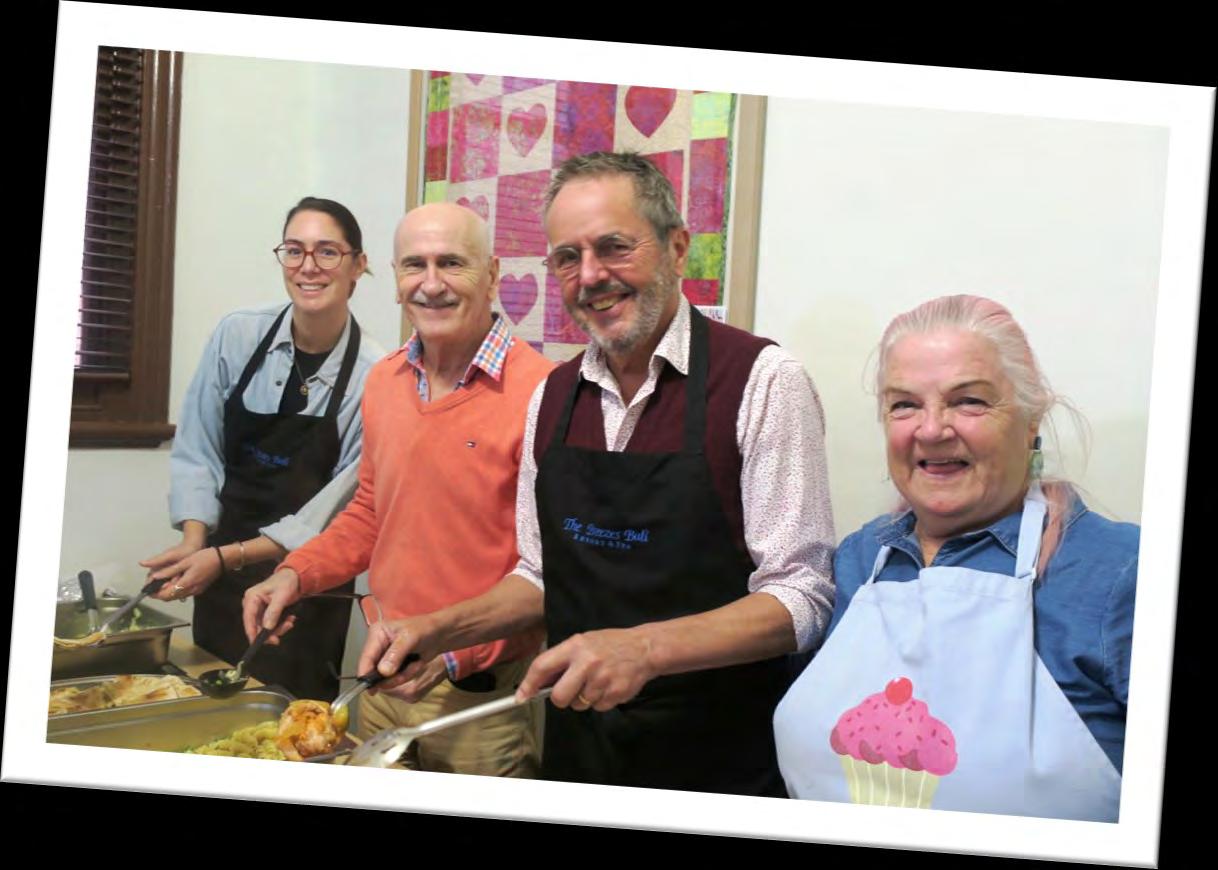
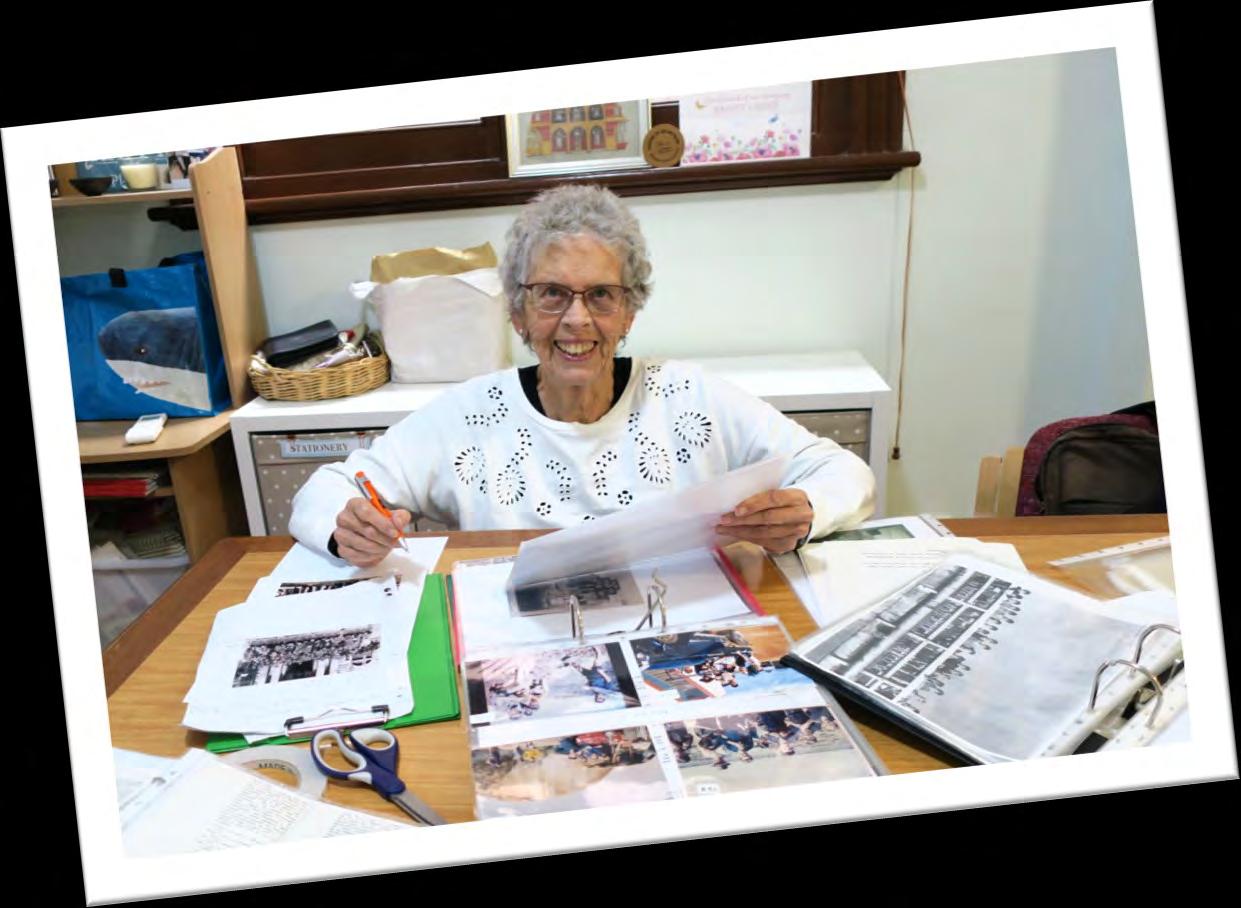


Director’s Report
2025 has been a year of connection, resilience, and hope for Tuart Place. Once again, we have witnessed the strength and solidarity of our community survivors supporting each other and finding new ways to heal.
One of the most significant milestones for Tuart Place this year was the resolution of our tenancy uncertainty at 24 High Street. After years of concern, we were most relieved to sign a new lease with the purchasers of the property Leonie and Tim Baldock, whose offer included a condition that Tuart Place remain a tenant with a five-year lease.
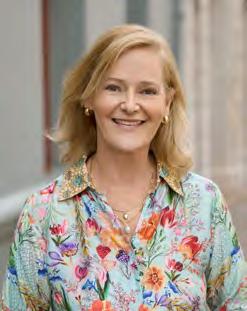
We look forward to thanking Tim and Leonie in person at a special event in March 2026 to thank everyone who supported the ‘Save Tuart Place’ campaign.
This year also marked a historic moment for Indigenous justice in Western Australia with the Cook Government’s announcement in May of a Stolen Generations redress scheme. This very welcome initiative aligns WA with other states, offering recognition and support to survivors. We extend our congratulations to Yokai and WASGAC for their tireless advocacy on this issue.
In another positive development, Tuart Place became part of the Work and Development Scheme a new initiative designed to assist people facing hardship in paying court fines. While WA no longer incarcerates people solely for unpaid fines, the debt can escalate through penalties, and other consequences like wage garnishments and driver’s license suspensions remain.
The Work and Development Scheme provides an opportunity for people to clear their fines by engaging in educational and life-skills activities, including counselling. We are proud to support this program, which is a partnership between the Department of Justice, Legal Aid, and the Aboriginal Legal Service of WA.
Like many non-profit organisations, Tuart Place dedicates significant effort to securing operational funding each year. This year, we were fortunate to receive support from a range of funding bodies. We thank Federal Member Josh Wilson for inviting us to apply for a Stronger Communities grant in February, which resulted in funding to upgrade our client service management software an important step in enhancing our ability to serve the community. Additionally, we were thrilled to secure a ‘Building Digital Skills’ grant
from ‘Good Things Australia’ for the 202428 period, enabling us to offer IT courses aimed at boosting participants' digital literacy and confidence with technology.
We also appreciate the generous Community Grants from the City of Fremantle and the Commonwealth Bank Fremantle Branch.
Our partnership with the WA Primary Health Alliance continues to provide vital support for our on-site specialist aged care finder, and we extend our thanks to contract manager Simona Sharry for her dedication to ensuring we meet all necessary requirements.
We are also very grateful to knowmore Legal Service for their continued support, particularly in facilitating Federal funding for our National Redress Scheme support service. Deputy CEO Nick Hudson’s leadership has ensured that Tuart Place receives comprehensive support, and we continue to benefit from the legal expertise of Amber Goerke and her colleagues at knowmore.
Since 2014, the WA Department of Communities has been our core funder, and we are most appreciative of their ongoing commitment. The Department helped us navigate the challenges surrounding our tenancy and has been a consistent and steadfast supporter of Tuart Place.
I am continually inspired by the unwavering dedication, compassion, and good humour of our Tuart Place staff. You are an exceptional team, and I thank you for the outstanding work you do to support our participants and clients.
I also extend my heartfelt thanks to FACT Chairperson John Ryall and all members of the Board for their steadfast guidance and governance throughout the year.
Our volunteers, who we recognize individually on page 4, continue to be an essential part of our success, and we are immensely grateful for their contributions.
It is a privilege to lead an organisation that remains so firmly aligned with its mission and values. While challenges remain, Tuart Place continues to be more than just a service it is a community, a safe haven, and a voice for justice. This year has reinforced our belief that, when we come together, anything is possible.
Dr Philippa White, Director, Tuart Place
Dr Philippa White
Safe and sound at 24 High Street!
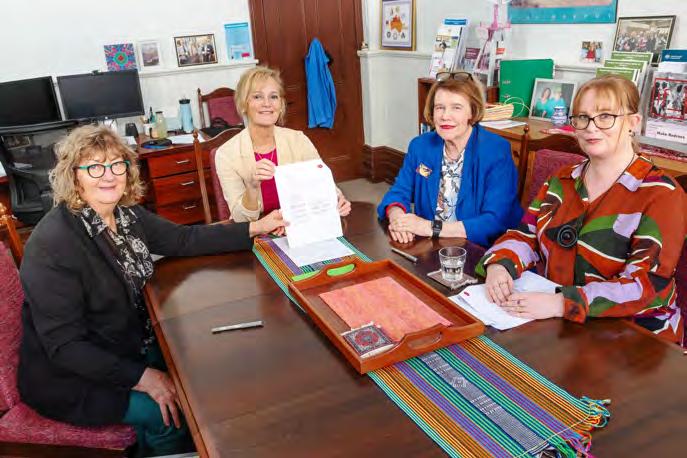
After several years of uncertaintyinvolving lots of work on the part of our staff and Board - and even a protest with our whole community - we are delighted to announce that we have signed a new lease at 24 High Street.
In May 2025, Leonie and Tim Baldock purchased the building. We are extremely grateful to the Baldocks for buying the property with the condition that Tuart Place remain as tenant.
Over the past two decades this place has become a safe haven and a second Home for hundreds of Care Leavers and we are overjoyed that we will continue to be part of the Fremantle community.
Adedicatedteamofcommittedprofessionals
The team at Tuart Place is united by their values and professional dedication to providing a welcoming and supportive environment for our participants and clients
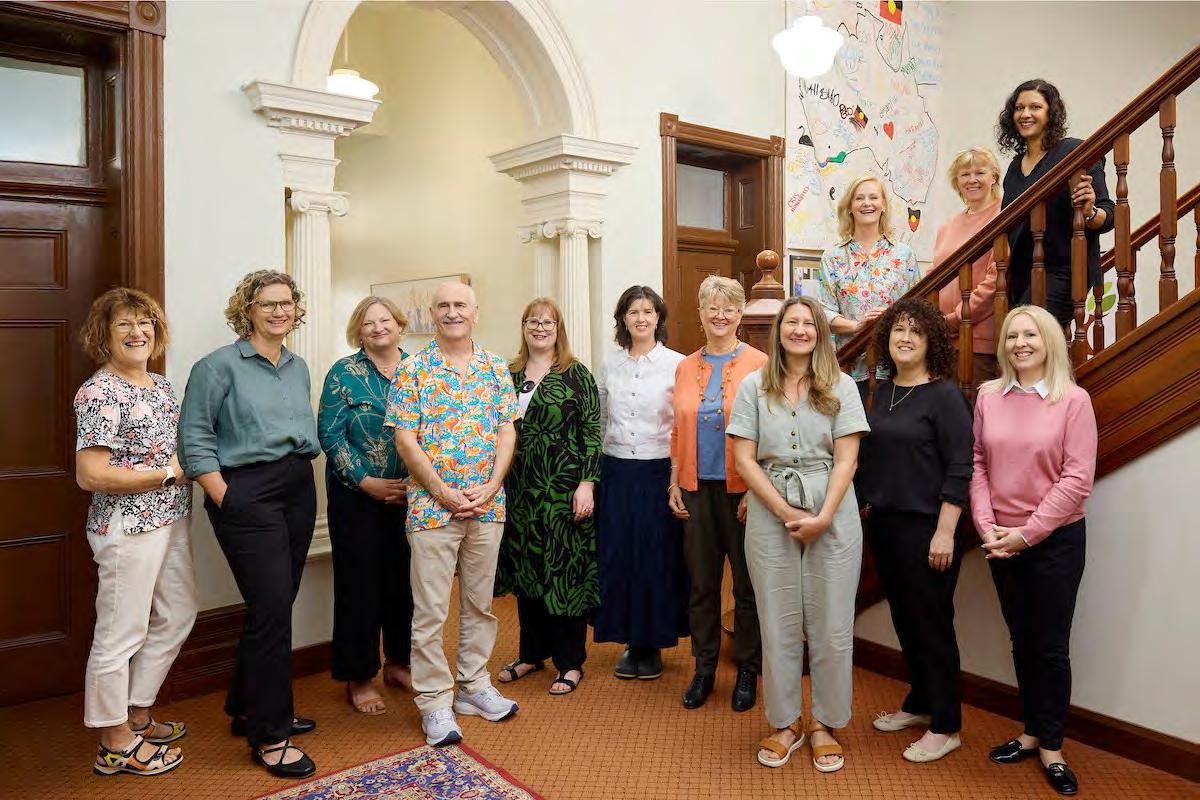
Tuart Place staff team 2024/25
Signing the lease at 24 High Street: Dr Philippa White (Director), Margo O’Byrne (Board Member and Convener of the Sustainable Tenancy Reference Group, Lyn Sherwood (Acting ViceChairperson), and Jo Faulkner (Operations Manager)
2024/25 Staff members :(L-R, front row): Counsellor Catherine Carr; Administrator Linda Olive; care finder Jane Hulands; Project Support Mal Edwards; Operations Manager Jo Faulkner; Office Coordinator Rosalie Grant; Counsellor Mary-Ann Oliver; Counsellor Emma Gregory; Counsellor Rose Fogarty; (Former) Outreach Officer Pauline Ivancich (L-R, stairs) Director Philippa White; Social Worker Jan Newman; Program Coordinator Natasha Samuelraj
Not pictured: Counsellor Pauline Thomas (see page 10)
Leadership in the sector
Ethical Decision-Making in Practice: Student social workers learning at Tuart Place
Social workers often face ethical challenges in their work in areas such as child protection, aged care, and the justice system.
The University of WA is trialling an innovative way to introduce Master of Social Work Students to ethical decision making in the field, by bringing groups of students out to an agency context to be challenged with an ethical decision-making task.
In May this year, social workers Jan Newman and Philippa White provided two workshops at Tuart Place to groups of approximately 20 students, presenting them with some of the tricky dilemmas that can arise in our area of work.
They used (carefully de-identified) case studies from real-life examples of social work practice at Tuart Place.
The students, accompanied by UWA lecturer Rex Wang, rose to the challenge and approached the case studies thoughtfully and comprehensively.
They recognised that Tuart Place’s wrap-around service delivery was an ideal model of support for people experiencing complex life problems. They also felt that the non-bureaucratic, informal environment at Tuart Place was likely to make clients feel more at ease, and more confident about accessing services and support.
The up-and-coming social workers demonstrated great talents and insight, and we’re sure they will make valuable contributions to the sector.
PHOTO: Pip and Jan with student social workers and UWA Lecturer Rex Wang at Tuart Place in May 2025
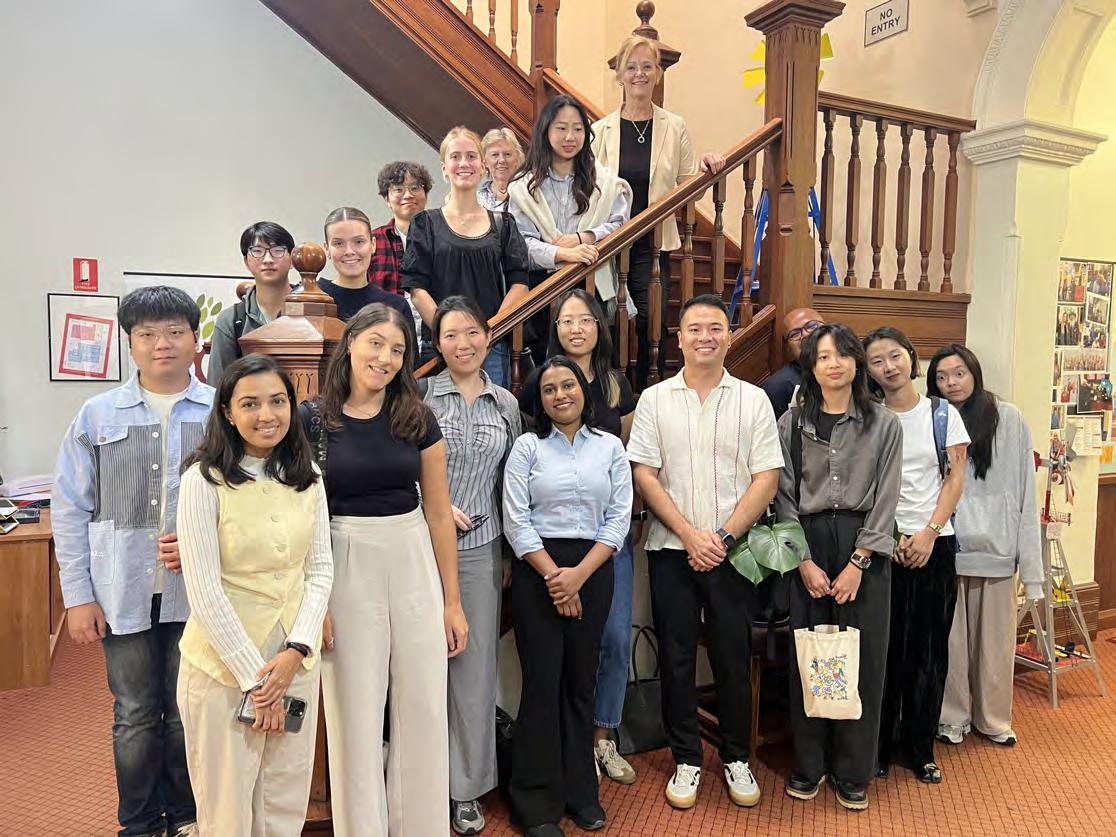
Creating Safer Futures
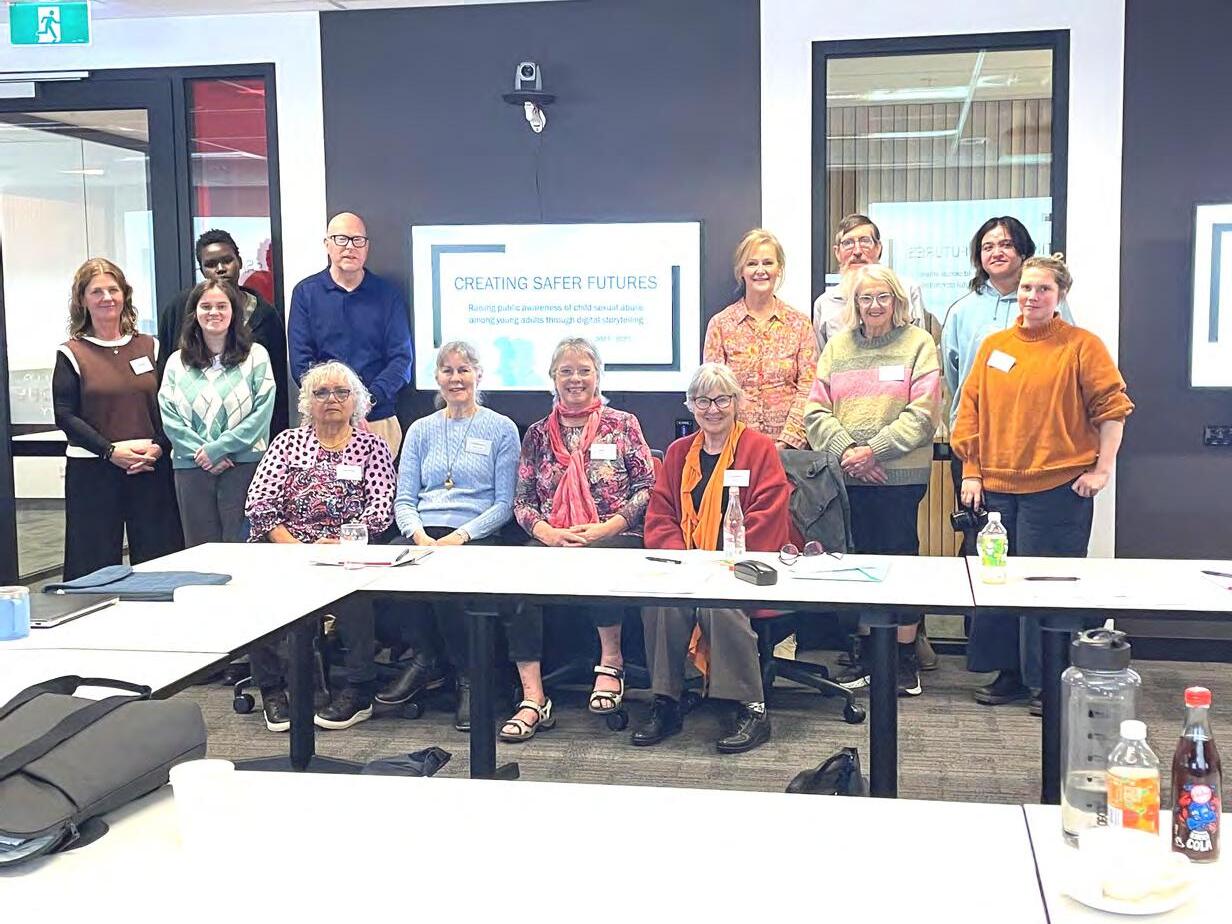
Child sexual abuse can be a difficult topic to discuss, leading to it being even more of a hidden problem. Historically, it meant that sexual abuse was a taboo subject, leaving victims and survivors feeling silenced and institutions less able to develop effective mechanisms for protection of children.
The Creating Safer Futures project, funded by the National Centre for Action on Child Sexual Abuse, and led by La Trobe University’s Assoc Professor Katie Wright, has looked at ways to encourage people to engage with difficult topics when the urge is to turn away.
Katie and her team brought together advocates, academics, and specialists from the creative industries. They identified a new approach to raising awareness among young adults about child sexual abuse by creating a storytelling prototype suited to the digital media age.
As a member of the Advisory Committee, Tuart Place Director Philippa White contributed input on several aspects of the project, including a fact sheet on working ethically and sensitively with victims and survivors, and a survey completed by 78 advocates in the sector.
Survey findings revealed strong agreement on elements of messaging, such as information about child sexual abuse that needs to be communicated. Key messages include: that child abuse could happen to a child close to you; it is more common than people think; it does enormous harm; everyone is responsible for prevention; and prevention is possible.
Well done to everyone who contributed to the Safer Futures and Breaking the Silence on Child Sexual Abuse initiatives.
Legislative win for survivors through strategic advocacy
In a landmark example of effective, multi-system advocacy, Tuart Place and its partners have successfully driven a change to legislation that will significantly benefit Care Leavers across Australia.
This important reform journey began in 2022, when the then FACT Chairperson Cevrina Reed and Tuart Place Director Philippa White collaborated with Matt Reed of Sum Effect Photography to produce a compelling four-minute video.
The video challenged the Federal Government’s practice of "clawing back" National Redress Scheme (NRS) payments through aged care means testing a practice that was clearly unjust.
The video, available at this link was screened at a National Forum in Queensland in April 2022, convened by Anne Livingstone of the National Aged & Community Care Roundtable for Forgotten Australians.
Senior bureaucrats attending the forum were visibly moved by Cevrina’s powerful testimony and the undeniable injustice the video exposed. On the spot, they pledged to pursue legislative change. Following extensive advocacy and consultation driven by Anne Livingstone, Tuart Place, and other key organisations such as knowmore Legal Service reform became a reality. On 1 January 2025, NRS payments became exempt from the residential aged care means test.
Importantly, the change applies retrospectively. This outcome represents a significant systemic victory for Care Leavers and a powerful reminder of what can be achieved through determined, collaborative advocacy.
Congratulations to everyone involved in achieving this important milestone.
Advisory Group members with the research team at La Trobe University, September 2025
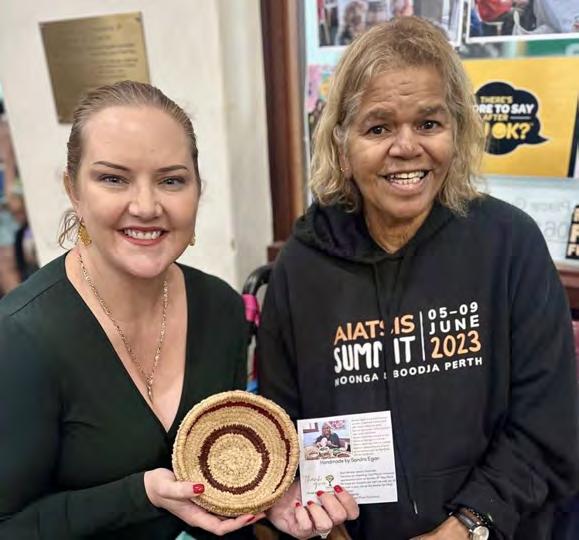
We had the pleasure of welcoming the Hon Jessica Stojkovski MLA, Minister for Child Protection, to Tuart Place for our Volunteer Appreciation event in May 2025.
During Jessica’s visit, we learned that she has hidden talents in singing and crafts, and is partial to an occasional ‘crafternoon’.
We were delighted to present the Minister with a beautiful handwoven basket crafted by Noongar artist and Tuart Place community member, Sandra Egan.
National Aged & Community Care Roundtable for Forgotten Australians
Tuart Place’s participation in the National Aged and Community Care Roundtable for Forgotten Australians ensures that the voices and perspectives of Western Australians are heard at a national level.
The Roundtable also provides an important platform for connecting with key decision-makers and influencing future directions in aged care.
Established in 2019 following a landmark national forum, the Roundtable has grown to over 100 members, including people with lived experience, service providers, researchers, and advocates.
Despite operating without core funding, it has gained significant national and international recognition, receiving prestigious awards in 2022 and 2024.
The Roundtable is a strong and consistent
advocate on issues affecting Forgotten Australians as they age. Its efforts have secured important wins, such as changes to the treatment of redress payments in aged care means testing, and increased recognition of the need for trauma-informed services.
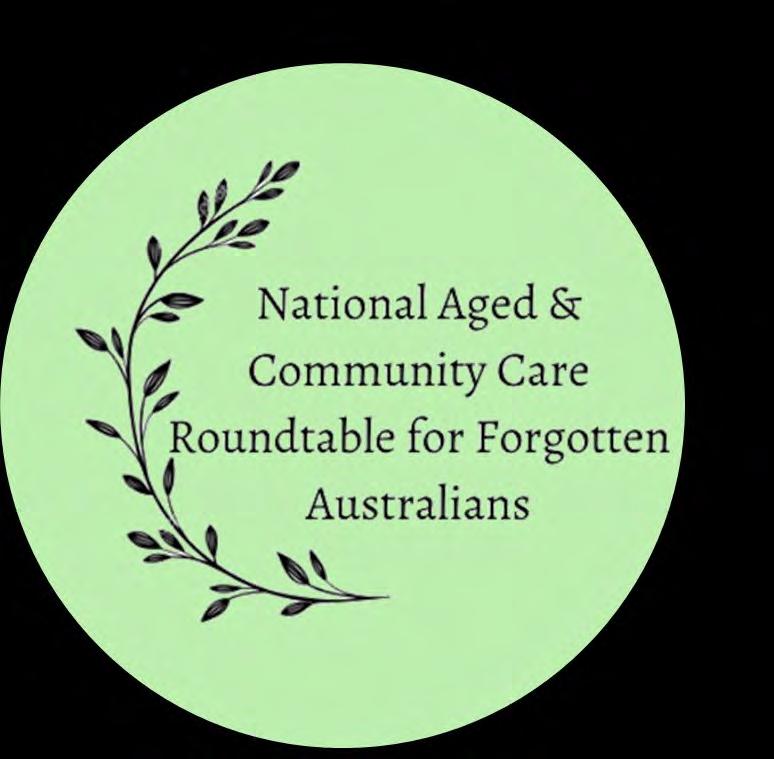
It has also been a driving force behind the Specialisation Verification Program, which highlights the urgent need for more aged care providers to be accredited to meet the specific needs of Forgotten Australians.
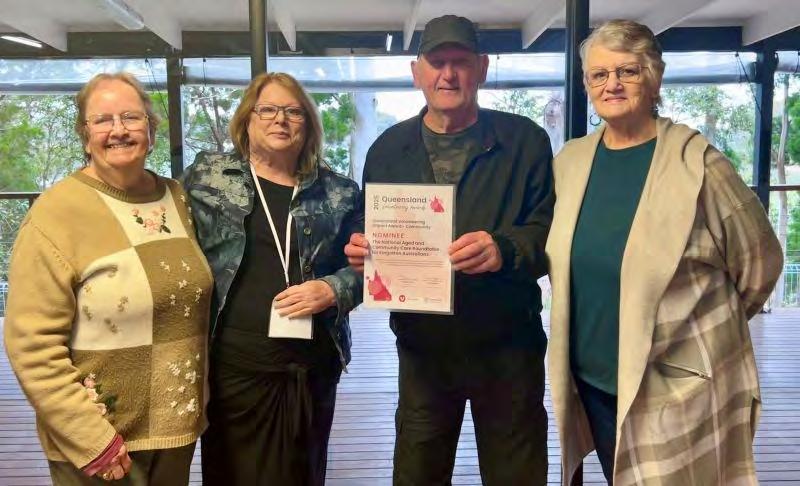
Current priorities include tackling premature ageing, addressing restrictive practices, and strengthening care navigation. Through collaborative service design projects and international research, the Roundtable continues to ensure that the rights and lived experiences of Forgotten Australians remain at the centre of reform.
Tuart Place is a founding member of this group and our contributions have been instrumental in gaining traction on key issues affecting older Care Leavers.
PHOTO: Roundtable Convenor Anne Livingstone (2nd from left) with volunteers at the 2024 awards
Strengtheningaccesstojustice
Tuart Place’s redress support service (RSS) is one of the highest performers nationally.
It is renowned for delivering high quality, well-researched applications; supported by trauma informed, culturally safe practice; alongside legal referrals and careful consideration of all the options available to survivors of institutional child sexual abuse seeking justice.
Tuart Place is among a select number of RSS’s contracted this year to manage ‘Section 24’ referrals.
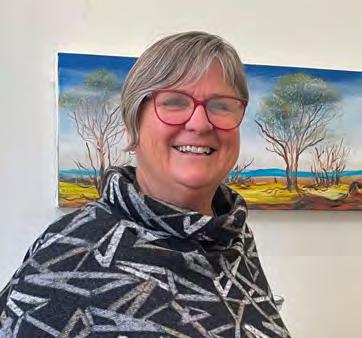
These referrals involve assisting survivors whose applications to the National Redress Scheme require additional information before they can be assessed.
In May 2025, we welcomed Counsellor Pauline Thomas to our team to lead our work on Section 24 referrals.
Pauline brings a strong commitment to social justice, a psychology degree, and extensive experience in suicide prevention and family and domestic violence services. Her expertise makes her particularly well-equipped to supporting applicants facing complex and layered challenges, which can be barriers to accessing redress and civil justice options.
If you have a Redress application in progress and are concerned that further information may be required for your case to be fairly assessed by the Scheme, please contact Pauline at Tuart Place.
carefinderat Tuart Place
Customised aged care support for Care Leavers
Tuart Place’s care finder program continues to support Care Leavers navigating the complex aged care systems and accessing the services they need. In the last year, Tuart Place provided more than 250 hours of personalised support to 46 participants, helping them understand their options and link to essential health, social, and community services.
Through persistent engagement and advocacy, our care finder Jane (and her sidekick Manni) work to strengthen independence, reduce isolation, and improve wellbeing ensuring that older Care Leavers with complex needs receive timely, tailored support to help them stay in their own homes for as long as possible.

Case Study
Helen (name changed for privacy), a 74-year-old First Nations woman and member of the Stolen Generations, was caring for adult children with significant medical challenges while managing her own chronic health conditions. Isolated, overwhelmed, and unsure how to access aged care support, she struggled to maintain her home and her wellbeing.
Tuart Place’s care finder, Jane, provided more than 25 hours of one-on-one support, building trust and helping Helen navigate complex aged care systems. Through culturally sensitive, trauma-informed guidance, Helen accessed the Short-Term Restorative Care program and a Level 3 Home Care Package, receiving home cleaning, mobility aids, allied health support, and social assistance. Helen reflected that she could not have accessed these essential services without Tuart Place. The support restored her independence, reduced her stress, and gave her confidence to focus on her health and caring responsibilities.
Tuart Place care finder team: Jane Hulands and support dog Manni
Pauline Thomas
Service Activity
Throughout the 2024/25 financial year, Tuart Place delivered a range of professional and clinical services, including trauma-informed counselling (in person and by phone), psychotherapy, and facilitated therapeutic support groups.
Our holistic, culturally safe wrap-around service model also included life-skills development opportunities; access to pro-bono health, financial, and legal support; individual advocacy; supported access to personal records; and tailored assistance with navigating aged care services.
Client engagement continued
to increase this year, with Tuart Place supporting a record number of individuals through the National Redress Scheme and civil litigation processes.
The table below outlines the number of participants and occasions of service for both clinical and other non-administrative services.
The highest demand service delivery areas in 2024/25 included psycho-social support; social connection through drop-in participation; assistance related to redress; referrals and liaison; counselling (including outreach and phone-based); supported records
Service statistics and information for the 2024/2025 financial year Tuart Place
access; and pro-bono access to health, legal, and financial services.
Psycho-Social Support
Psycho-social support at Tuart Place is delivered through both clinical and non-clinical staff in a variety of formats.
Each morning, our team meets to tailor care and support for participants, aligning with Tuart Place’s therapeutic ‘whole-of-service’ approach. Every instance of support delivered through a warm, informal, and relational style is offered with therapeutic intent and plays a vital role in contributing to the positive outcomes experienced by many participants.
National Redress Scheme (NRS)
For many survivors, sharing traumatic childhood experiences and being believed and validated by an institutional authority can result in profound therapeutic benefits such as increased feelings of self-worth, empowerment, and renewed trust and confidence. For participants, particularly those on fixed incomes, financial redress has practical benefits.
Our NRS support includes records searches, preparation of comprehensive applications, traumainformed, culturally safe counselling, and direct liaison with the Scheme. Support is available throughout the process and after its conclusion.
We receive expert legal input from knowmore Legal Service on our applications, and new disclosures of abuse are assessed for possible civil action. Where appropriate, we refer people to specialist law firms.
“Without redress, I would never have been able to go back home for the very first time and meet my family… Redress helped me with that a lot. Without help… I would not have had that chance.”

Participants frequently access additional support services legal, financial, health during the redress process, benefiting from Tuart Place’s integrated service model that allows seamless access across programs.
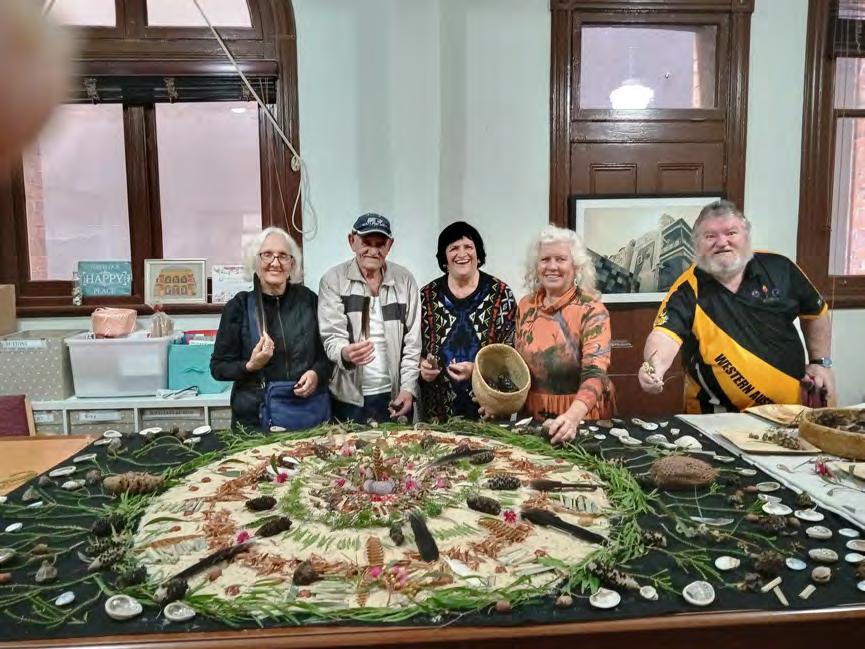
isolation due to separation from their families during childhood and further disconnection and trauma often experienced in out of home care.
making, assertive communication, and confidence building.
Feedback from participants confirms that this approach is best practice in supporting a disadvantaged group with complex and diverse needs.
Social Connection
Our strengths-based approach promotes social engagement as a means of improving wellbeing. This aspect of service is especially important for older Care Leavers who
In 2024/25, social connection was facilitated at our on-site drop-in centre, as well as a broad range of outings, celebrations, reunions, and group events many initiated and led by participants and the Tuart Place Social Activities Group.
Life Skills and Literacy
Wherever possible, we provide avenues for participants to build skills that enhance personal agency and self-determination.
Focus areas include decision-
Services include personalised skills tuition; psycho-educational workshops; involvement in community education initiatives; writing for Tuart Place newsletters; and sharing skills through arts, crafts, and peer-led sessions.
Counselling and Phone Outreach
Counselling services are traumainformed and available in both structured and informal formats, consistent with our client-focused, low-barrier model of care.
There is no limit to the number of sessions a person can receive. Participants may choose regular intensive support or dip in and out of counselling as needed. Internal referrals ensure safe and familiar pathways into counselling for those who may have been reluctant to seek support through formal channels.

IT Skills and Computer Lab
Improving digital inclusion for Care Leavers is a key Strategic Goal (2021–25). Our onsite IT volunteers provide one-on-one support to participants seeking assistance with computers, tablets, and smartphones.
Participant feedback confirms that this support has improved confidence and enabled skills development in areas such as
Service activity (continued)
using mobile devices; browsing the internet; sending emails; scanning photos; connecting with loved ones; and accessing online services like MyGov and My Aged Care.
For those with existing digital skills, free access to our computer lab and WiFi is available during opening hours.
Aged Care Support
As participants age, Tuart Place
continues to provide dedicated and specialised assistance through our aged care finder service.
Details of the care finder program can be found on page 10 of this report.
Advocacy, Referral & Liaison
This area of service included many different issues, for example: housing transfer advocacy; liaison with community corrections and aged care
From Learning to Lasting Impact

providers; support for care leavers in custody; assistance with financial and health matters; Stolen Wages claims; and navigating historical abuse complaints involving past provider institutions.
We are seeing an increase in the complexity of needs, and the requirement for coordinated advocacy and referral continues to gain significance as a vital aspect of our service delivery.
With the support of scholarships offered by the WA Department of Communities, Tuart Place counsellors Rose (on left) and Pauline recently completed the Professional Certificate in Understanding Childhood Trauma.
The course, developed by trauma specialists at the Australian Centre for Child Protection, offers a powerful exploration of how trauma affects brain development, attachment, and intergenerational wellbeing.
Both Rose and Pauline found that the flexible structure allowed for deep reflection and engagement with the material.
This experience not only expanded their professional knowledge, but also strengthened their passion for supporting survivors impacted by trauma.

Tuart Place Service Evaluation
The ‘Tell us what you think’ Survey
The Tell us what you think Engagement Survey is designed to collect and record feedback from participants about their experience of services at Tuart Place. The survey helps us to gain a deeper understanding of what does and doesn’t work.
We administered the survey in 2022 (32 responses) and 2025 (25 responses). The following report provides information about the 57 responses received. The survey includes questions about how participants felt about themself after using Tuart Place’s services; about the staff at Tuart Place; and whether they would recommend Tuart Place to others.
Importantly, the survey also contains open-
“I used to feel unwelcome, unwanted, socially inept, unworthy. Tuart Place changed all that in my life.”
ended questions to gather more detailed feedback, including participants’ favourite part of Tuart Place, and whether would they like anything to be changed or offered differently at Tuart Place.
The feedback was overwhelmingly positive and commonly touched on themes of community and social connection; feeling supported by both staff and fellow participants; feeling ‘comfortable’ and ‘belonging’; and a sense of people wanting to help each other.
“I was going down, but Tuart Place turned my life around.”
Participants overwhelmingly indicated that Tuart Place has had a positive impact on their lives. Over 96% of respondents indicated agreement that they felt more confident in their ability to make positive life changes; more at ease; more able to communicate with others; be more socially connected; more able to find/ask for support; and have more hope for the future.
The staff at Tuart Place are a vital part of our community, providing support in a way that fosters healing, growth, and connection. Over 98% of respondents said they felt that Tuart Place staff treated them with respect; were friendly and approachable; and listened to their needs; and gave adequate information.
“The staff is very good. They all know me, and I know them.”
The overwhelming majority of open-ended responses spoke, in one way or another, about the sense of community, belonging, and togetherness at Tuart Place. Many participants commented on the meals at Tuart Place; the pleasure of sharing good food together;
“You feel like you’re home. They’re happy to see me again – you can be gone for a long time... They don’t forget you’ve been here. Everyone has a place here.” “You forget what’s hard. We comfort each other. We’re all the same, no worries.”
and enjoying joining in activities.
The positive impact of Tuart Place’s participantled service model shone through in the responses. Responses also showed the importance of feeling understood, listened to, and of finding community with others who have a shared experience. One hundred percent of respondents indicated that they would recommend the service to others and in all cases the comments were positive.
The Tell us what you think Engagement Survey clearly illustrates the positive difference Tuart Place makes in the lives of our participants, and we thank all those who took part.
Special thanks to Em Stark, Behavioral Science intern from the University of Notre Dame, who administered the 2025 service evaluation and wrote this summary.

Social Connection




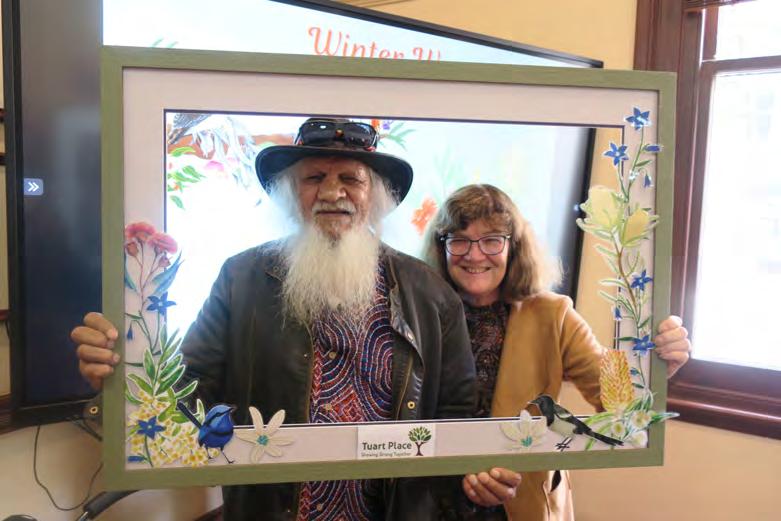

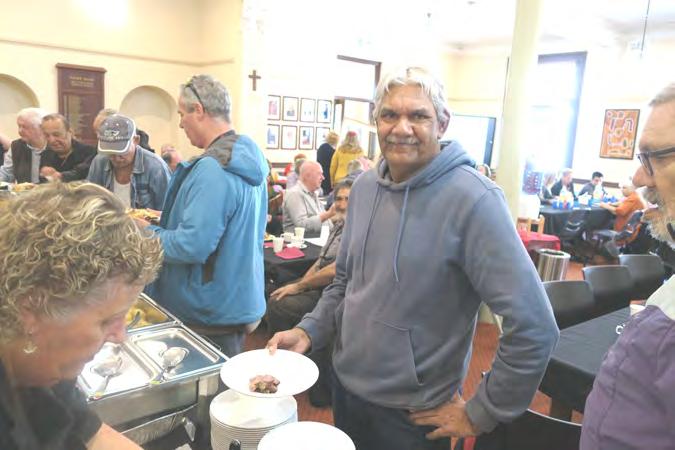

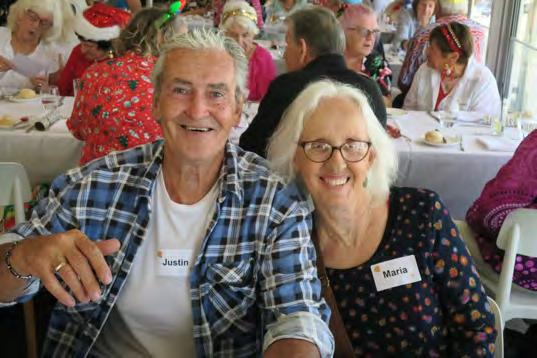


Social Connection


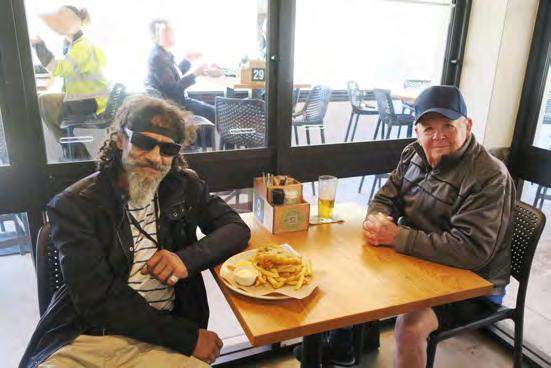
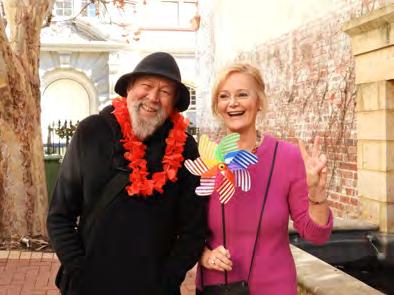


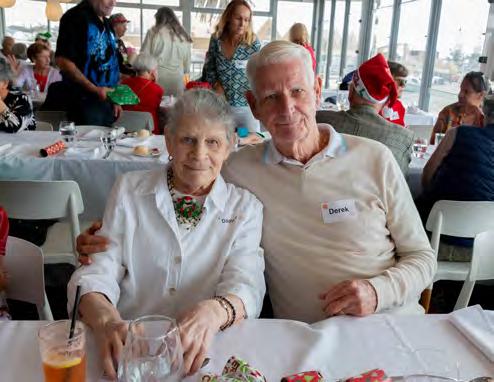
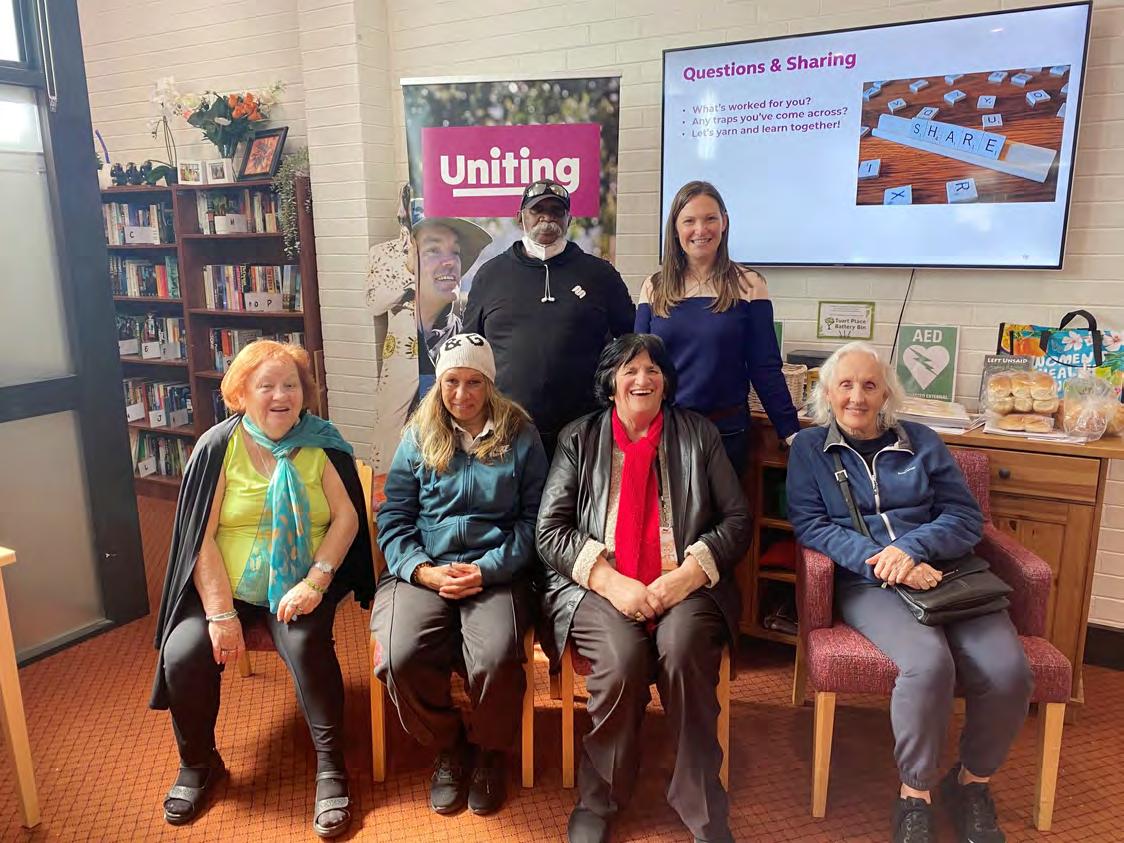

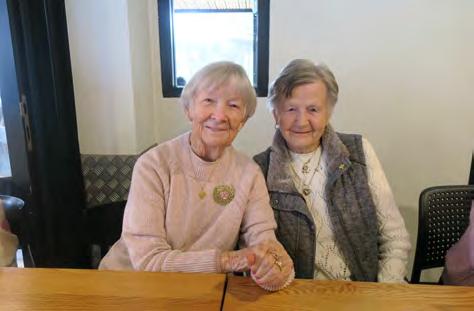

Tuart Place
24 High Street
Fremantle
Western Australia 6160
Phone: (08) 6140-2380
Freecall: 1800-619-795
Email: admin@tuartplace.org Web: www.tuartplace.org

Tuart Place Patrons
Tuart Place is fortunate to have the support of three Patrons who generously donate their time and expertise in support of our services. To find out more about our Patrons, visit www.tuartplace.org/about/patrons

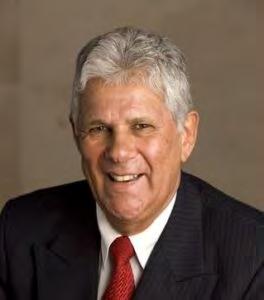

Your DONATION is tax deductable and your contributions will directly support Care Leavers.
To donate, use the PayPal Donate button on the Tuart Place website, or donate via Electronic Funds Transfer.
Account name: Forgotten Australians Coming Together Inc
BSB: 066-107
Account number: 1048-4327
Inc
Financial statements are available on the Tuart Place website: www.tuartplace.org
You can VOLUNTEER your time and skills, and make connections with a great bunch of people!
Perhaps you would like to help with community lunches, spend time socialising with participants in the drop-centre, or share your skills?
Send an email to programs@tuartplace.org to express your interest to Program Coordinator Natasha Samuelraj
The Annual Report is published by Copy Magic, a West Australian company certified by the Sustainable Green Print and Green Stamp programs. These programs assist the printing industry to reduce waste in increase recycling.


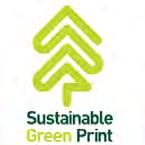
Former Senator Rachel Siewert Dr Robert Isaacs OAM
Senator Dean Smith
Forgotten Australians Coming Together Inc
Financial Statements
For the Year Ended 30 June 2025
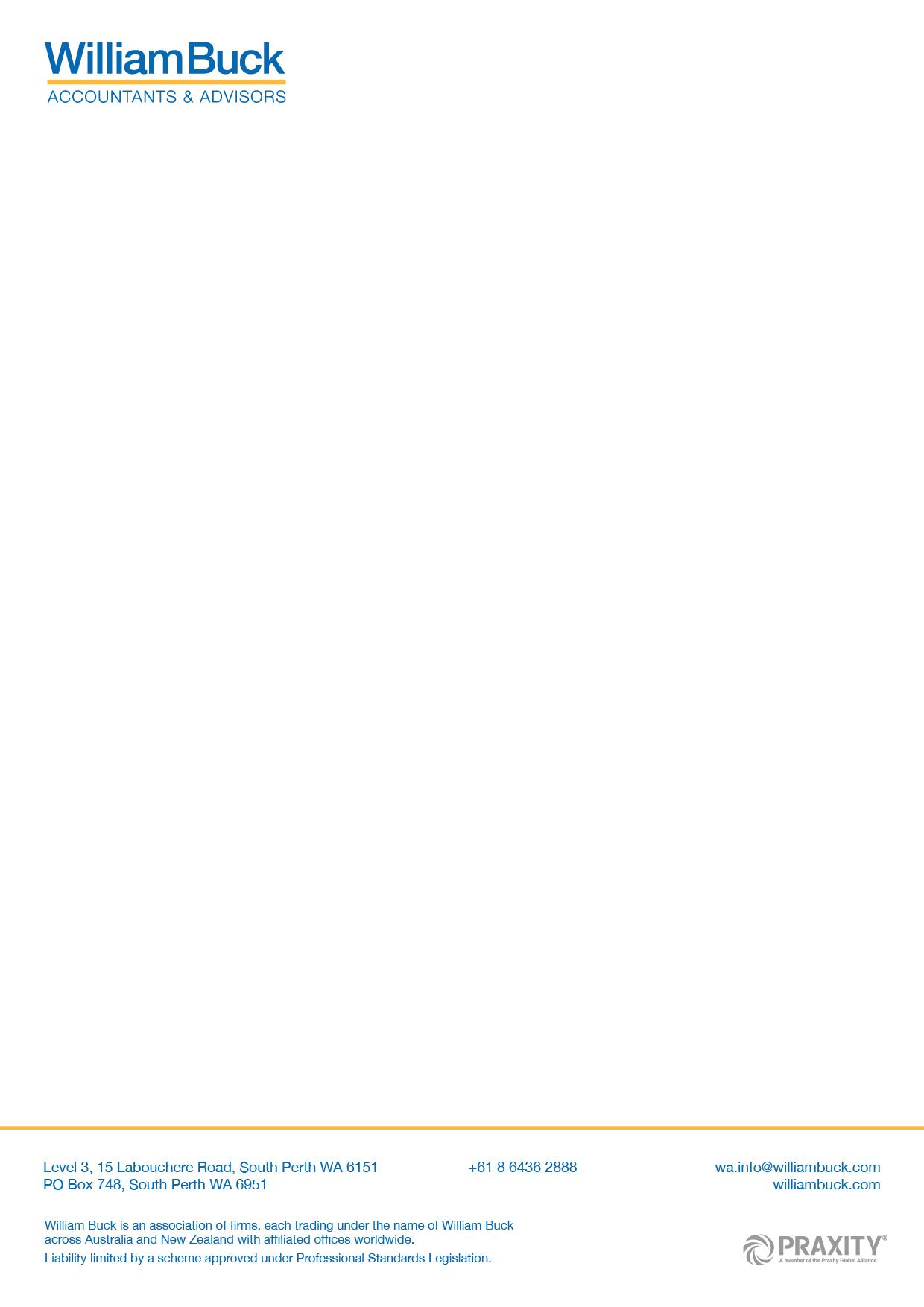
Auditor’s Independence Declaration
To the Directors of Forgotten Australians Coming Together Inc.
As lead auditor for the audit of Forgotten Australians Coming Together for the year ended 30 June 2025, I declare that, to the best of my knowledge and belief, there have been:
no contraventions of the auditor independence requirements as set out in the Australian Charities and Not-for-profits Commission Act 2012 in relation to the audit; and no contraventions of any applicable code of professional conduct in relation to the audit.

William Buck Audit (WA) Pty Ltd
ABN 67 125 012 124

Conley Manifis Director
Dated this 8th October 2025
Statement of Profit or Loss and Other Comprehensive Income
For the Year Ended 30 June 2025
Items that will not be reclassified subsequently to profit or loss - -
Items that will be reclassified to profit or loss when specific conditions are met
Statement of Financial Position
As At 30 June 2025
The accompanying notes form part of these financial statements.
Statement of Changes in Equity
For the Year Ended 30 June 2025
Statement of Cash Flows
For the Year Ended 30 June 2025
CASH FLOWS FROM OPERATING ACTIVITIES:
CASH FLOWS FROM INVESTING ACTIVITIES:
CASH FLOWS FROM FINANCING ACTIVITIES:
The accompanying notes form part of these financial statements.
Notes to the Financial Statements
For the Year Ended 30 June 2025
The financial report covers Forgotten Australians Coming Together Inc as an individual entity. Forgotten Australians Coming Together Inc is a not-for-profit Association, registered and domiciled in Australia.
The principal activities of the Association for the year ended 30 June 2025 were providing professional clinical services and peer support and leadership opportunities to 'Forgotten Australians', Former Child Migrants, and members of the Stolen Generations, collectively known as care leavers. All services are free of charge, and include counselling, support groups, supported access to records, family tracing, peer-led social activities, and a drop in centre.
The functional and presentation currency of Forgotten Australians Coming Together Inc is Australian dollars.
The financial report was authorised for issue by the Board of Management on 19 September 2025
Comparatives are consistent with prior years, unless otherwise stated.
1 Basis of Preparation
The financial statements are general purpose financial statements that have been prepared in accordance with the Australian Accounting Standards - Simplified Disclosure and the Australian Charities and Not-for-profits Commission Act 2012.
The financial statements have been prepared on an accruals basis and are based on historical costs modified, where applicable, by the measurement at fair value of selected non-current assets, financial assets and financial liabilities.
Significant accounting policies adopted in the preparation of these financial statements are presented below and are consistent with prior reporting periods unless otherwise stated.
2 Material Accounting Policy Information
(a) Revenue and other income
Grant revenue
Grant revenue is recognised in profit or loss when the incorporated association satisfies the performance obligations stated within the funding agreements.
If conditions are attached to the grant which must be satisfied before the incorporated association is eligible to retain the contribution, the grant will be recognised in the statement of financial position as a liability until those conditions are satisfied.
Government grants
Government grant revenue is initially recognised as a financial liability and revenue recognised as services are performed or performance obligations are fulfilled that meet the criteria for each of the incorporated association's different activities. Such grants are reciprocal and are received as cash for zero value with a requirement for refund of unspent funds.
Non-government grants and subsidies
Non-government grant revenue is initially recognised as a financial liability and revenue subsequently recognised as services are performed or performance obligations fulfilled that meet the criteria for each of the incorporated association’s different activities. Some of these grants are reciprocal and are received as cash for zero value with a requirement for refund of unspent funds. A certain number of these grants are provided as a third-party service provider on behalf of independent charities.
Notes to the Financial Statements
For the Year Ended 30 June 2025
2 Material Accounting Policy Information
(a) Revenue and other income
Grant revenue
Grant revenue
Unconditional grants
Unconditional grants are those provided by independent charities and are initially recognised as a financial liability. Revenue is subsequently recognised as and when the services for these grants funds are performed and meet the criteria for each of the incorporated association’s different activities. Such grants are nonreciprocal and are received in the form of cash for zero value.
Donations
Donations and bequests are recognised as revenue when received.
Other income
Other income is recognised on an accruals basis when the Association is entitled to it.
(b) Income Tax
The Association is exempt from income tax under Division 50 of the Income Tax Assessment Act 1997
(c) Goods and services tax (GST)
Revenue, expenses and assets are recognised net of the amount of goods and services tax (GST), except where the amount of GST incurred is not recoverable from the Australian Taxation Office (ATO).
Receivables and payable are stated inclusive of GST.
Cash flows in the statement of cash flows are included on a gross basis and the GST component of cash flows arising from investing and financing activities which is recoverable from, or payable to, the taxation authority is classified as operating cash flows.
(d) Property, plant and equipment
Each class of property, plant and equipment is carried at cost or fair value less, where applicable, any accumulated depreciation and impairment.
Plant and equipment
Plant and equipment are measured using the revaluation model.
Depreciation
Property, plant and equipment, excluding freehold land, is depreciated on a straight-line basis over the assets useful life to the Association, commencing when the asset is ready for use.
Notes to the Financial Statements
For the Year Ended 30 June 2025
2 Material Accounting Policy Information
The depreciation rates used for each class of depreciable asset are shown below:
Fixed asset class
(e) Financial instruments
Financial instruments are recognised initially on the date that the Association becomes party to the contractual provisions of the instrument.
On initial recognition, all financial instruments are measured at fair value plus transaction costs (except for instruments measured at fair value through profit or loss where transaction costs are expensed as incurred).
Financial assets
All recognised financial assets are subsequently measured in their entirety at either amortised cost or fair value, depending on the classification of the financial assets.
Classification
On initial recognition, the Association classifies its financial assets into the following categories, those measured at:
amortised cost
fair value through profit or loss - FVTPL
fair value through other comprehensive income - equity instrument (FVOCI - equity)
fair value through other comprehensive income - debt investments (FVOCI - debt)
Financial assets are not reclassified subsequent to their initial recognition unless the Association changes its business model for managing financial assets.
Amortised cost
Assets measured at amortised cost are financial assets where:
the business model is to hold assets to collect contractual cash flows; and
the contractual terms give rise on specified dates to cash flows are solely payments of principal and interest on the principal amount outstanding.
The Association's financial assets measured at amortised cost comprise trade and other receivables, term deposits with a maturity of greater than 3 months from balance date and cash and cash equivalents in the statement of financial position.
Subsequent to initial recognition, these assets are carried at amortised cost using the effective interest rate
Notes to the Financial Statements
For the Year Ended 30 June 2025
2 Material Accounting Policy Information (e) Financial instruments
Financial assets method less provision for impairment.
Interest income, foreign exchange gains or losses and impairment are recognised in profit or loss. Gain or loss on derecognition is recognised in profit or loss.
When determining whether the credit risk of a financial assets has increased significant since initial recognition and when estimating ECL, the Association considers reasonable and supportable information that is relevant and available without undue cost or effort. This includes both quantitative and qualitative information and analysis based on the Association's historical experience and informed credit assessment and including forward looking information.
The Association uses the presumption that an asset which is more than 30 days past due has seen a significant increase in credit risk.
The Association uses the presumption that a financial asset is in default when:
the other party is unlikely to pay its credit obligations to the Association in full, without recourse to the Association to actions such as realising security (if any is held); or
the financial assets is more than 90 days past due.
Credit losses are measured as the present value of the difference between the cash flows due to the Association in accordance with the contract and the cash flows expected to be received. This is applied using a probability weighted approach.
Trade receivables
Impairment of trade receivables are determined using the simplified approach in AASB 9 which uses an estimation of lifetime expected credit losses. The Association has determined the probability of non-payment of the receivable and multiplied this by the amount of the expected loss arising from default.
The amount of the impairment is recorded in a separate allowance account with the loss being recognised in finance expense. Once the receivable is determined to be uncollectable then the gross carrying amount is written off against the associated allowance.
Where the Association renegotiates the terms of trade receivables due from certain customers, the new expected cash flows are discounted at the original effective interest rate and any resulting difference to the carrying value is recognised in profit or loss.
Other financial assets measured at amortised cost
Impairment of other financial assets measured at amortised cost are determined using the expected credit loss model in AASB 9. On initial recognition of the asset, an estimate of the expected credit losses for the next 12 months is recognised. Where the asset has experienced significant increase in credit risk then the lifetime losses are estimated and recognised.
Notes to the Financial Statements
For the Year Ended 30 June 2025
2 Material Accounting Policy Information
(e) Financial instruments
Financial liabilities
The Association measures all financial liabilities initially at fair value less transaction costs, subsequently financial liabilities are measured at amortised cost using the effective interest rate method.
The financial liabilities of the Association comprise trade payables, bank and other loans and lease liabilities.
(f) Cash and cash equivalents
Cash and cash equivalents comprises cash on hand, demand deposits and short-term investments which are readily convertible to known amounts of cash and which are subject to an insignificant risk of change in value.
(g) Leases
At the lease commencement, the Association recognises a right-of-use asset and associated lease liability for the lease term. The lease term includes extension periods where the Association believes it is reasonably certain that the option will be exercised.
The right-of-use asset is measured using the cost model where cost on initial recognition comprises of the lease liability, initial direct costs, prepaid lease payments, estimated cost of removal and restoration less any lease incentives received.
The right-of-use asset is depreciated over the lease term on a straight line basis and assessed for impairment in accordance with the impairment of assets accounting policy.
Exceptions to lease accounting
The Association has elected to apply the exceptions to lease accounting for both short-term leases (i.e. leases with a term of less than or equal to 12 months) and leases of low-value assets. The Association recognises the payments associated with these leases as an expense on a straight-line basis over the lease term.
(h) Provisions
Provisions are recognised when the Association has a legal or constructive obligation, as a result of past events, for which it is probable that an outflow of economic benefits will result and that outflow can be reliably measured.
Provisions recognised represent the best estimate of the amounts required to settle the obligation at the end of the reporting period.
Notes to the Financial Statements
For the Year Ended 30 June 2025
2 Material Accounting Policy Information
(i)
Other Liabilities
Other liabilities represent the unutilised amounts of unconditional grants received in advance to enable the Association to generally fulfill its charitable objectives. The Association may invest such funds received as it considers appropriate, benefiting from any interest received and retains substantially all the risks and rewards of ownership of the funds. Accordingly, the Association continues to recognise the unconditional grant funds as a financial asset and recognises an equal amount as a financial liability to expend such funds at its discretion, as required by paragraph 3.2.15 of AASB 9. The services provided by such unconditional grants are usually provided within 17 to 25 months of receipt of the grant. The financial liability is reduced as and when revenue and corresponding expense is recognized in accordance with the Associations revenue recognition policy and when the criteria for each of the Association’s different activities have been met.
(j) Adoption of new and revised accounting standards
The Association has adopted all standards which became effective for the first time at 30 June 2025, the adoption of these standards has not caused any material adjustments to the reported financial position, performance or cash flow of the Association or refer to Note for details of the changes due to standards adopted in the prior year.
3 Critical Accounting Estimates and Judgments
The Board of Management make estimates and judgements during the preparation of these financial statements regarding assumptions about current and future events affecting transactions and balances.
These estimates and judgements are based on the best information available at the time of preparing the financial statements, however as additional information is known then the actual results may differ from the estimates.
The significant estimates and judgements made have been described below.
Key estimates - Useful Economic Life of Equipment
The Association’s Board of Management determines the estimate of useful life and related depreciation charges for its equipment.
Key judgments - Long service leave
Assumptions are formulated when determining the Association’s long service leave obligations. This requires estimation of the probability of current employees attaining the service period required to qualify for long service leave benefits as well as the usual pattern in which leave is taken once all service requirements have been met.
Notes to the Financial Statements
Notes to the Financial Statements
For the Year Ended 30 June 2025
The maturity analysis of lease liabilities based on contractual undiscounted cash flows is shown in the table below:
Notes to the Financial Statements
The carrying value of trade and other payables is considered a reasonable approximation of fair value due to the shortterm nature of the balances.
9 Provisions
10 Key Management Personnel Remuneration
The remuneration paid to key management personnel of Forgotten Australians Coming Together Inc during the year is as follows:
11 Contingencies
In the opinion of the Board of Management, the Association did not have any contingencies at 30 June 2025 (30 June 2024:None).
12 Related Parties
(a) The Association's main related parties are as follows:
There were no transactions with related parties during the current previous financial years.
Key management personnel - refer to Note 10
There were no trade receivables from or trade payables to related parties during the current previous financial
Notes to the Financial Statements
For the Year Ended 30 June 2025
12 Related Parties
(a) The Association's main related parties are as follows:
(a) The Association's main related parties are as follows: years.
There were no to or from related parties during the current previous financial years.
13 Events after the end of the Reporting Period
The financial report was authorised for issue on by the Board of Management
No matters or circumstances have arisen since the end of the financial year which significantly affected or may significantly affect the operations of the Association, the results of those operations or the state of affairs of the Association in future financial years.
14 Statutory Information
The registered office and principal place of business of the association is:
Forgotten Australian Coming Together Inc 24 High Street Fremantle WA 6160
Responsible Persons' Declaration
The responsible persons declare that in the responsible persons' opinion:
there are reasonable grounds to believe that the registered entity is able to pay all of its debts, as and when they become due and payable; and
the financial statements and notes satisfy the requirements of the Australian Charities and Not-for-profits Commission Act 2012
Signed in accordance with subsection 60.15(2) of the Australian Charities and Not-for-profit Commission Regulation 2022.

Responsible person
Dated
8th October 2025

Forgotten Australians Coming Together Inc
Independent Audit Report to the members of Forgotten Australians Coming Together Inc
Report on the Audit of the Financial Report
Opinion
We have audited the financial report of Forgotten Australians Coming Together Inc, which comprises the statement of financial position as at 30 June 2025, the statement of profit or loss and other comprehensive income, the statement of changes in equity and the statement of cash flows for the year then ended, and notes to the financial statements, including a summary of significant accounting policies, and the responsible persons' declaration
In our opinion the financial report of Forgotten Australians Coming Together Inc has been prepared in accordance with Division 60 of the Australian Charities and Not-for-profits Commission Act 2012, including:
(i) giving a true and fair view of the Registered Entity's financial position as at 30 June 2025 and of its financial performance for the year ended; and
(ii) complying with Australian Accounting Standards - Reduced Disclosure Requirements and Division 60 of the Australian Charities and Not-for-profits Commission Regulation 2013.
Basis for Opinion
We conducted our audit in accordance with Australian Auditing Standards. Our responsibilities under those standards are further described in the Auditor's Responsibilities for the Audit of the Financial Report section of our report. We are independent of the Registered Entity in accordance with the auditor independence requirements of the Australian Charities and Not-for-profits Commission Act 2012 (ACNC Act) and the ethical requirements of the Accounting Professional and Ethical Standards Board's APES 110 Code of Ethics for Professional Accountants (the Code) that are relevant to our audit of the financial report in Australia. We have also fulfilled our other ethical responsibilities in accordance with the Code.
We believe that the audit evidence we have obtained is sufficient and appropriate to provide a basis for our opinion
Responsibilities of Responsible Entities for the Financial Report
The responsible persons of the Registered Entity are responsible for the preparation and fair presentation of the financial report in accordance with Australian Accounting Standards - Reduced Disclosure Requirements and the ACNC Act, and for such internal control as the responsible entities determine is necessary to enable the preparation of the financial report that is free from material misstatement, whether due to fraud or error.
In preparing the financial report, the responsible persons are responsible for assessing the Registered Entity's ability to continue as a going concern, disclosing, as applicable, matters related to going concern and using the going concern basis of accounting unless the responsible entities either intends to liquidate the Registered Entity or to cease operations, or has no realistic alternative but to do so.
Those charged with governance are responsible for overseeing the Registered Entity's financial reporting process.

Independent auditor’s report to the members of Forgotten Australians Coming Together Inc.
Report on the audit of the financial report

Our opinion on the financial report
In our opinion, the accompanying financial report of Forgotten Australians Coming Together Inc. (the Association) has been prepared in accordance with Division 60 of the Australian Charities and Not-forprofits Commission Act 2012, including: giving a true and fair view of the Association’s financial position as at 30 June 2025 and of its financial performance for the year then ended; and complying with Australian Accounting Standards – Simplified Disclosures and Division 60 of the Australian Charities and Not-for-profits Commission Regulations 2022.
What was audited?
We have audited the financial report of the Association, which comprises the statement of financial position as at 30 June 2025, the statement of profit or loss and other comprehensive incomefor the year then ended, the statement of changes in equity for the year then ended, the statement of cash flows for the year then ended, notes to the financial statements, including material accounting policy information, and the members of the Board declaration.
Basis for opinion

We conducted our audit in accordance with Australian Auditing Standards. Our responsibilities under those standards are further described in the Auditor’s responsibilities for the audit of the financial report section of our report. We are independent of the Association in accordance with the auditor independence requirements of the Australian Charities and Not-for-profits Commission Act 2012 (ACNC Act) and the ethical requirements of the Accounting Professional and Ethical Standards Board’s APES 110 Code of Ethics for Professional Accountants (including Independence Standards) (the Code) that are relevant to our audit of the financial report in Australia. We have also fulfilled our other ethical responsibilities in accordance with the Code.
We believe that the audit evidence we have obtained is sufficient and appropriate to provide a basis for our opinion.

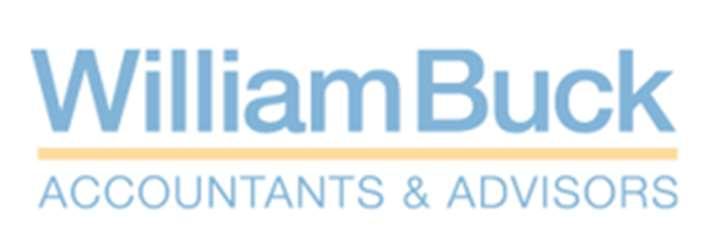
Other information
The members of the Board are responsible for the other information. The other information comprises the information included in the Associations annual report for the year ended 30 June 2025, but does not include the financial report and our auditor’s report thereon.
Our opinion on the financial report does not cover the other information and accordingly we do not express any form of assurance conclusion thereon.
In connection with our audit of the financial report, our responsibility is to read the other information and, in doing so, consider whether the other information is materially inconsistent with the financial report or our knowledge obtained in the audit or otherwise appears to be materially misstated.
If, based on the work we have performed, we conclude that there is a material misstatement of this other information, we are required to report that fact. We have nothing to report in this regard.
Responsibilitiesof the members of the Board for the financial report
The members of the Board of the Association are responsiblefor the preparation of the financial report that gives a true and fair view in accordance with Australian Accounting Standards – Simplified Disclosures and the Australian Charities and Not-for-profits Commission Act 2012. The members of the Board responsibility also includes such internal control as the members of the Board determine is necessary to enable the preparation of the financial report that gives a true and fair view and is free from material misstatement, whether due to fraud or error.
In preparing the financial report, the members of the Board are responsible for assessing the Association’s ability to continue as a going concern, disclosing, as applicable, matters related to going concern and using the going concern basis of accounting unless the members of the Board either intend to liquidate the Association or to cease operations, or have no realistic alternative but to do so.
The members of the Board are responsible for overseeing the Association’s financial reporting process.
Auditor’s responsibilities for the audit ofthefinancial report
Our objectives are to obtain reasonable assurance about whether the financial report as a whole is free from material misstatement, whether due to fraud or error, and to issue an auditor’s report that includes our opinion. Reasonable assurance is a high level of assurance, but is not a guarantee that an audit conducted in accordance with Australian Auditing Standards will always detect a material misstatement when it exists. Misstatements can arise from fraud or error and are considered material if, individually or in the aggregate, they could reasonably be expected to influence the economic decisions of users taken on the basis of this financial report.
A further description of our responsibilities for the audit of the financial report is located at the Auditing and Assurance Standards Board website at:
https://www.auasb.gov.au/auditors_responsibilities/ar4.pdf
This description forms part of our auditor’s report.


William Buck Audit (WA) Pty Ltd
ABN 67 125 012 124

Conley Manifis Director
Dated this 8th day of October 2025
